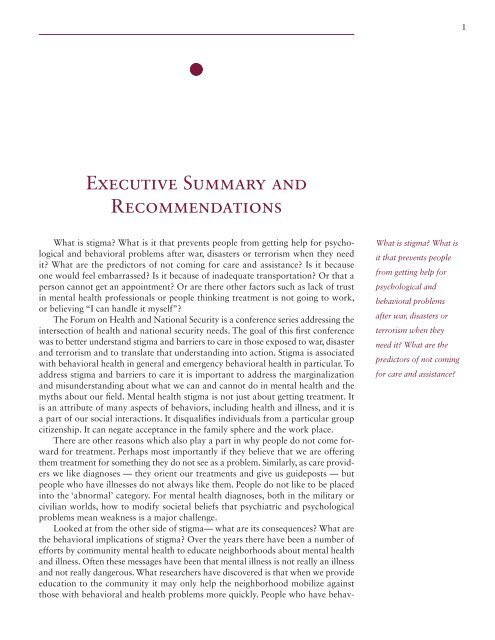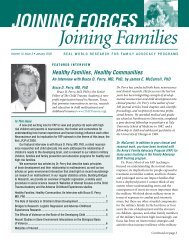stigma and barriers to care - Uniformed Services University of the ...
stigma and barriers to care - Uniformed Services University of the ...
stigma and barriers to care - Uniformed Services University of the ...
You also want an ePaper? Increase the reach of your titles
YUMPU automatically turns print PDFs into web optimized ePapers that Google loves.
Executive Summary 1<br />
Executive Summary <strong>and</strong><br />
Recommendations<br />
What is <strong>stigma</strong> What is it that prevents people from getting help for psychological<br />
<strong>and</strong> behavioral problems after war, disasters or terrorism when <strong>the</strong>y need<br />
it What are <strong>the</strong> predic<strong>to</strong>rs <strong>of</strong> not coming for <strong>care</strong> <strong>and</strong> assistance Is it because<br />
one would feel embarrassed Is it because <strong>of</strong> inadequate transportation Or that a<br />
person cannot get an appointment Or are <strong>the</strong>re o<strong>the</strong>r fac<strong>to</strong>rs such as lack <strong>of</strong> trust<br />
in mental health pr<strong>of</strong>essionals or people thinking treatment is not going <strong>to</strong> work,<br />
or believing “I can h<strong>and</strong>le it myself”<br />
The Forum on Health <strong>and</strong> National Security is a conference series addressing <strong>the</strong><br />
intersection <strong>of</strong> health <strong>and</strong> national security needs. The goal <strong>of</strong> this first conference<br />
was <strong>to</strong> better underst<strong>and</strong> <strong>stigma</strong> <strong>and</strong> <strong>barriers</strong> <strong>to</strong> <strong>care</strong> in those exposed <strong>to</strong> war, disaster<br />
<strong>and</strong> terrorism <strong>and</strong> <strong>to</strong> translate that underst<strong>and</strong>ing in<strong>to</strong> action. Stigma is associated<br />
with behavioral health in general <strong>and</strong> emergency behavioral health in particular. To<br />
address <strong>stigma</strong> <strong>and</strong> <strong>barriers</strong> <strong>to</strong> <strong>care</strong> it is important <strong>to</strong> address <strong>the</strong> marginalization<br />
<strong>and</strong> misunderst<strong>and</strong>ing about what we can <strong>and</strong> cannot do in mental health <strong>and</strong> <strong>the</strong><br />
myths about our field. Mental health <strong>stigma</strong> is not just about getting treatment. It<br />
is an attribute <strong>of</strong> many aspects <strong>of</strong> behaviors, including health <strong>and</strong> illness, <strong>and</strong> it is<br />
a part <strong>of</strong> our social interactions. It disqualifies individuals from a particular group<br />
citizenship. It can negate acceptance in <strong>the</strong> family sphere <strong>and</strong> <strong>the</strong> work place.<br />
There are o<strong>the</strong>r reasons which also play a part in why people do not come forward<br />
for treatment. Perhaps most importantly if <strong>the</strong>y believe that we are <strong>of</strong>fering<br />
<strong>the</strong>m treatment for something <strong>the</strong>y do not see as a problem. Similarly, as <strong>care</strong> providers<br />
we like diagnoses — <strong>the</strong>y orient our treatments <strong>and</strong> give us guideposts — but<br />
people who have illnesses do not always like <strong>the</strong>m. People do not like <strong>to</strong> be placed<br />
in<strong>to</strong> <strong>the</strong> ‘abnormal’ category. For mental health diagnoses, both in <strong>the</strong> military or<br />
civilian worlds, how <strong>to</strong> modify societal beliefs that psychiatric <strong>and</strong> psychological<br />
problems mean weakness is a major challenge.<br />
Looked at from <strong>the</strong> o<strong>the</strong>r side <strong>of</strong> <strong>stigma</strong>— what are its consequences What are<br />
<strong>the</strong> behavioral implications <strong>of</strong> <strong>stigma</strong> Over <strong>the</strong> years <strong>the</strong>re have been a number <strong>of</strong><br />
efforts by community mental health <strong>to</strong> educate neighborhoods about mental health<br />
<strong>and</strong> illness. Often <strong>the</strong>se messages have been that mental illness is not really an illness<br />
<strong>and</strong> not really dangerous. What researchers have discovered is that when we provide<br />
education <strong>to</strong> <strong>the</strong> community it may only help <strong>the</strong> neighborhood mobilize against<br />
those with behavioral <strong>and</strong> health problems more quickly. People who have behav-<br />
What is <strong>stigma</strong> What is<br />
it that prevents people<br />
from getting help for<br />
psychological <strong>and</strong><br />
behavioral problems<br />
after war, disasters or<br />
terrorism when <strong>the</strong>y<br />
need it What are <strong>the</strong><br />
predic<strong>to</strong>rs <strong>of</strong> not coming<br />
for <strong>care</strong> <strong>and</strong> assistance




